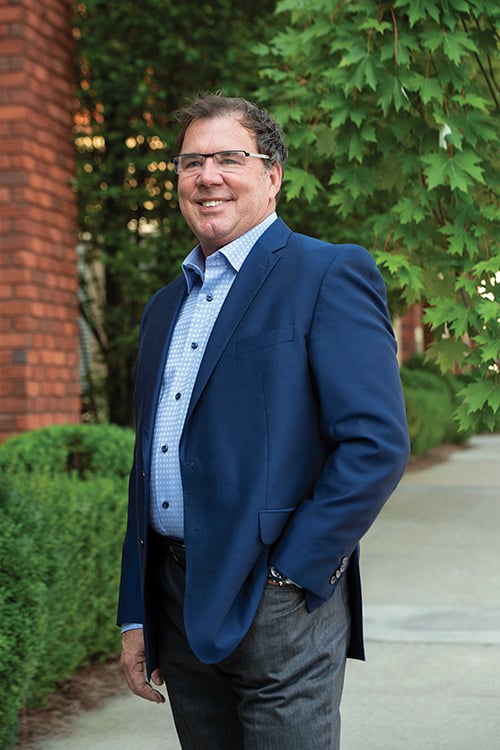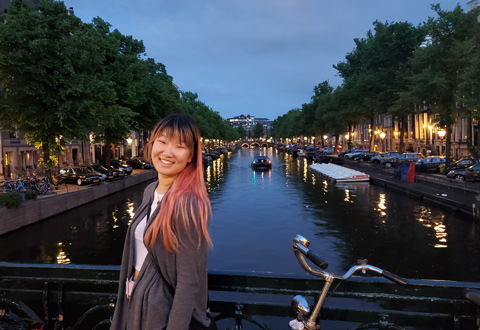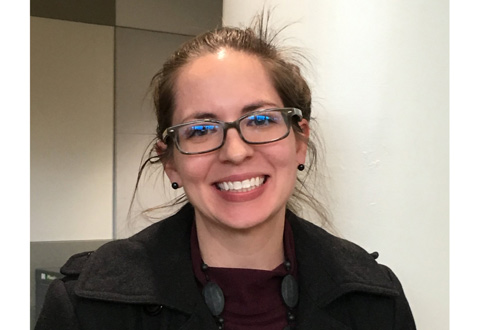Back to Earth (Link)
By: Kristin Baird Rattini | Categories: Alumni Achievements

In the late 1990s, dialup internet service was the standard and companies flooded your mailbox—your physical mailbox—with compact discs to get you to join the throngs going online. At the time, internet service provider EarthLink was not only an industry leader, but also a household name. By 2000, EarthLink’s merger with Atlanta-based MindSpring made it the second-largest ISP, behind AOL. But as the online space changed rapidly, the spotlight moved on to other tech darlings and the company fell off the public’s radar.
EarthLink didn’t disappear; the company simply moved away from residential internet to focus on business services and enteprise-level products.. Today, its relatively new CEO, Glenn Goad, MS MoT 07, is determined to return the 25-year-old ISP back to its position as an industry leader. Goad sat down with the Alumni Magazine to share how he’s leveraging EarthLink’s partnerships and growth opportunities to strike the ideal combination of what customers truly want and what the latest advances in technology can provide.
Q: Your career trajectory is unusual for a technology CEO: the Air Force, then the hospitality industry, then tech. Talk us through that progression.
A: The Air Force gave me three takeaways: service, respect and accountability. The hospitality industry is one where you have to enjoy serving others; you’re always trying to create memorable experiences for others. While in the hospitality industry, I was an early adopter of technology and leveraged it long before it was common. I built spreadsheet algorithms for rate optimization and leveraged the internet for acquiring customers for our hotels. That led me to technology-driven companies and ultimately into digital customer acquisition.
Q: How did your decade in digital customer acquisition prime you for your EarthLink position?
A: My previous jobs at Allconnect and Qology Direct were to acquire customers for companies like AT&T, Comcast and EarthLink. In fact, during my tenure at Allconnect, we were EarthLink’s number one acquisition partner for a number of years. So I had a chance to get to know the brand’s attributes and history. We sold a lot of internet. We probably connected over five million consumers to EarthLink’s Internet during that time.
What I learned through that process is that customers were not able to buy the Internet the way they wanted to buy it. The value proposition for most companies had become that if you bought a bundle, it was cheaper, so consumers ended up with things like a home phone, video or some other add-on that they didn’t really want. They also had to pay for speeds they didn’t need. EarthLink delivers a far more straightforward, streamlined internet offering. And to join this ISP that delivers the internet the way companies should seemed a natural opportunity for me.
Q: You came to EarthLink through a merger with your previous company, NQue Technologies. What are the synergies between the two firms?
A: NQue was about serving the next customer in the queue. We built a technology that gathers as much information as possible before you get to an automated system. It takes the consumer through the quickest path to either answer their question or get them to the person they need without having to answer the same questions over and over. We knew this technology would be useful to EarthLink in creating a superior customer service experience for a company that recognizes that customers are the most important thing.
Q: What is your greatest challenge at EarthLink?
A: I think it’s managing the pace of change. This is a 25-year-old business that has very loyal customers and is very rooted in certain ways, whether it’s technology, process or people. I can’t come in, snap my fingers, turn that all upside down and say, “We’re going to be a very different company tomorrow.”
Q: What are EarthLink’s advantages in the marketplace?
A: We are a pure internet service provider. That is what we come to work every day to be better at. If you look across the spectrum, there’s nobody we compete with where that’s all they do—internet is only a part of what they do in addition to a multitude of other services. Another advantage is that we are not tethered to a single technology.
Our responsibility is to always be chasing and partnering with the best technologies out there, and our business is grounded in those trusted partnerships. We have them across the spectrum, whether it’s fiber, 5G, etc. The tech doesn’t have to be invented here at EarthLink. Our job is to find the right technology, put the right experience with it, put our wrapper around that, and provide it to our customers.
Q: What are you doing to make EarthLink as relevant and innovative today as it was at its outset?
A: In the past year, we’ve invested in three areas that I think put EarthLink back in the limelight. One is delivering speeds up to 1 gigabyte per second. Although most people don’t need that speed, everyone wants to know it’s available if they want it.
Second, this company has always had privacy and security at its forefront, and it is a stake in the ground for us as we go forward. When you have an EarthLink account, you’ll have the same level of privacy as a VPN where nobody knows who you are, what and where you are searching. And we’ll be deploying a product—a box for inside the home— that will monitor content coming across the network, in both directions, in real time.
Third, we want to deliver a customer service experience like no other ISP. We want to create an environment where you enjoy using our service and feel like you have a partner in us. We’re deploying technology, like the NQue platform, and we’re training agents to provide a better experience.
Q: How has your management of technology master’s degree from Tech served you in your career?
A: Prior to having my master’s degree, I made a lot of decisions that were based on experience and/or my gut. For the most part, that worked out. But at Tech, I learned a lot from both my professors and classmates that made my decision-making process more formal, repeatable and, probably more importantly, understandable for those around me.
To have that intersection of going to Georgia Tech, being in Atlanta and then leading this iconic brand that evolved here, it all feels like it was meant to be.


